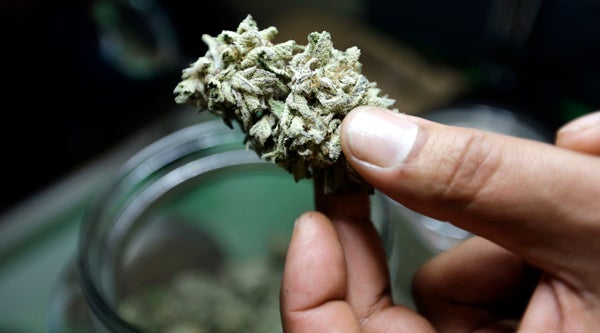Medical marijuana for young adults? Drexel researcher to study benefits, drawbacks

Drexel researcher to study benefits, drawbacks of medical marijuana for young adults (Elaine Thompson/ AP Photo, file)
More than a dozen states, including New Jersey, have legalized medical marijuana in some manner, but whether the policies benefit or harm young adults is unclear.
Stephen Lankenau, a researcher at Drexel University’s School of Public Health, will use a $3 million grant from the National Institutes of Health to assess the medical, psychological and social effects of such laws on people ages 18 to 26.
Medical marijuana “is being implemented in states with some guidance from the scientific literature, but there’s really no studies that can tell you what the implications are for a young adult population,” says Lankenau.
He wants to find out whether young adults experience negative or positive health outcomes from using medical marijuana, and whether they’re more prone to abuse harder drugs.
“Is it a good policy for young adults? What about those young adults not treated as well by conventional therapies? There’s a debate,” he said.
The 5-year study will follow 380 young adults in Los Angeles. Half of the study subjects use marijuana via a doctor’s recommendation and half use it recreationally.
Why L.A.?
Medical marijuana is more widespread there compared with other parts of the country. California was the first state to pass a medical marijuana law in 1996 and Los Angeles has nearly 1,000 medical marijuana dispensaries, according to Lankenau. That’s in contrast to New Jersey, where just one dispensary has been in operation since the state passed a medical marijuana law in 2011.
A spokesman with NIH described Lankenau’s project as “the first to specifically look at young adults ages 18-26 through direct interaction with them.” A study out of the University of California-San Francisco is also zeroing in on this age group by using already existing national survey data.
Lankenau said he thinks the research is particularly slim on young adults because policymakers initially designed medical marijuana laws with older adults in mind, as well as those with terminal and chronic illnesses including glaucoma and HIV/AIDS. In places such as California, where medical marijuana has been in use for some time, Lankanau has seen the drug go beyond its original design to include other illnesses, including anxiety, that might pertain to young adults just as much.
Despite the L.A. focus, Lankanau said the findings could have broader implications.
“We hope that what we find there could be applied to other states, and the things we learn there — the things that worked and didn’t — could be applied to [policies in] other regions,” he said.
WHYY is your source for fact-based, in-depth journalism and information. As a nonprofit organization, we rely on financial support from readers like you. Please give today.

